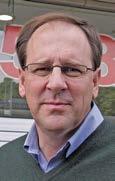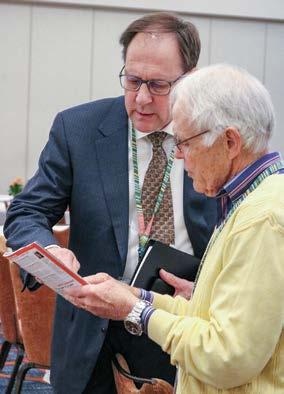
6 minute read
Opportunities to improve lives
Opportunities to improve lives
Outgoing chair reflects on nine years with the MEDA board
When Tim Penner reflects on his MEDA involvements over the years, he uses words like exhilarating and opportunities. “It’s so exhilarating that all of these great things have happened,” says the Kansas businessman.
Penner completes nine years on the board, most recently as chair, at MEDA’s annual meeting in Tucson in early November.

Tim Penner

Tim Penner discusses a convention program with board member mYRL nOFZIGER
MEDA has transformed the lives of many for the better, providing opportunity through economic development, he said. “There’s so many good things that we have done, but I really think the future holds so much more.”
Penner is chief executive officer of agricultural equipment manufacturer Harper Industries. He first became aware of MEDA in the 1980s, when he and his wife Faith served with Mennonite Central Committee in Bolivia. MEDA was also active in Bolivia then.
Staff of the two organizations would sometimes cross paths, as they were cooperating on a bean growing project. “I saw how MEDA gave opportunities to farmers in rural Bolivia.” The Penners’ MCC community development work made them aware of the huge need people have to understand their situation from a business and economic perspective. “I was always really impressed with MEDA.”
When he moved to Kansas in 1991 to take a job there, the Kansas MEDA chapter invited him to join their board. “There’s quite an openness to working with MEDA there,” he recalls.
Dinner meetings of 75 to 100 people were common. Large expressions of support for MEDA projects from Kansans continue to be the norm. Three years ago, 18 supporters went on a MEDA tour to Nicaragua, he said. “When we do the right thing and have a measure of success, people will want to join you.”
After buying Harper Industries in the late 1990s, he began attending annual MEDA conventions.
During his time on the MEDA board, Penner has visited past or current MEDA projects in Kenya, Tanzania, Jordan, Paraguay, Bolivia, Peru and the Ukraine.
The Penners’ son Daniel, a video producer in Seattle, did a MEDA internship with the Ghana Greater Opportunities for Rural Women (GROW) project. That experience was transformative both for him and the women soybean farmers, Tim said.
MEDA’s lead firm model supports businesses that in turn work with farmers to grow higher value commodities. That approach provides amazing opportunities that improve the lives of many in emerging markets, he said.
In February, Penner was at a Sam’s Club store in Wichita with MEDA’s Tanzania country director (who was visiting Kansas). They got to see how a MEDA lead firm helped the labor of Tanzanian farmers to reach North American consumers. The previous year, in January 2018, Penner was part of a MEDA group visiting farmers in rural Tanzania. He heard how MEDA lead firm Natural Extracts Inc. (NEI) was teaching farmers like Martha Kisanga to grow organic vanilla.
Growing half an acre of vanilla on her three-acre property helped Kisanga earn far more income than she gets from her other crops. Some of NEI’s other farmer clients are doubling their purchasing power by growing vanilla beans.
Producing quality organic vanilla allowed NEI to sign a deal with a US luxury ice cream manufacturer. Penner was thrilled to find a case of that ice cream at Sam’s Club in Wichita. He later showed the empty container to staff at a MEDA event in the spring.
Values and integrity are key to MEDA’s success, he says. “They are essential to making MEDA what it has been and form the foundation for future growth. I see the work we do as definitely being faith-motivated.” Some of the language that MEDA uses may be altered somewhat in order to become more inclusive, he said. “The values and the things that brought us to this point, we cannot discard.”
Penner was pleased to work with MEDA during a period of record-breaking growth in its reach and number of clients served.
“I really want to give credit to (former president) Allan Sauder. What a tremendous fellow, how he worked to make MEDA a very effective organization.”
Working with integrity and vastly expanding partnerships with donors and institutional funders are his memories of interactions with Sauder. “So many people have contributed. It’s the whole team.”
MEDA’s future success will require the organization to make the right moves, to say no in the right places and say yes in the right places in terms of focus, he said.
He was part of the search committee when MEDA hired its first female chief executive officer, Dr. Dorothy Nyambi. Nyambi, a Cameroonian Canadian medical doctor with decades of international development experience, joined MEDA in late 2018. “Commitment, enthusiasm, and community are three characteristics that come to mind when I think about Tim,” Nyambi said. “I am sincerely grateful for his leadership, professionalism, personal commitment and contribution to MEDA. He will be missed!”
Three billion people live on less than $2.50 a day, Penner noted in an address to MEDA’s board in June. MEDA’s goal is to “put money in the pockets of those who need it” through creating business solutions to poverty, he said.
Quoting from Melinda Gate’s book The Moment of Lift (see review, pg. 21), Penner said lifting up women lifts up all of humanity.
Nyambi’s leadership will provide a moment of lift that will take MEDA to the next level, he predicted. ◆
Giving and growing
For Harper Industries, giving back is more than a sentiment — it’s a key part of how they do business.
The Kansas firm manufactures livestock feeding equipment, hydraulic truck solutions for work trucks and turf maintenance equipment. Their corporate philosophy includes donating 10 percent of company profits to church and community-related charitable entities.
Harper Industries is the largest manufacturing employer in its county. It employs 120 in Harper, Kansas, a community of about 1,500 people. The firm would like to add five staff by year-end, says TimPenner, the company’s chief executive officer and majority shareholder.
The company was recently honored for community involvement in the Wichita Journal’s Manufacturing, Wholesale and Distribution Awards. It works with county school systems through a transition to career program.
It hires high school students as summer interns and sponsors a variety of community events.
Some farm equipment manufacturers have been warning of a slowdown. Penner expects Harper’s sales for the fiscal year that ends in October 2019 will be up 10 to 15 percent from a year earlier.
In May, they acquired competitor Butler Beds of Bixby, Oklahoma and transferred that operation to their Kansas facilities. Over the coming year, Penner believes Harper’s sales will rise another 25 to 30 percent.
Harper’s commitment to donating a 10th of profits to charity is impressive and rare. “Big corporations will talk about partnerships and community support for projects, but it’s never to the tune of 10 percent,” Penner says when asked.
A commitment to that level of corporate giving is one of the points in the philosophy document written when Harper was founded in 1998. Between 50 and 60 percent of Harper’s sales are agriculture-related. The remainder is almost evenly split between their truck hydraulic and sports turf products. Harper’s agriculture and hydraulics lines are focused on North America.
It also sells into southeast Asia, the United Kingdom, and the Middle East with its turf equipment. Part of Harper’s success is related to focus, knowing how to say no to opportunities that are not core to its business. Harper uses a GPS system — guide for proposed strategies — as a capability compass.
That helps them to make a go- or no-go decision on business strategies. The company developed a two-page document outlining this philosophy several years ago, Penner said.
The document outlines corporate strengths to propel its success. This includes the scope of product offerings through “efficient and reliable solutions that reduce labor costs,” and the scope of customers and markets that they will pursue. ◆






